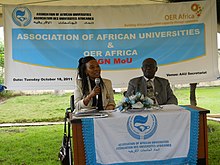
OER Ghana - Insert a lead here. The lead should be a sentence or two that explains what this article is about.
Overview edit
In Ghana there is an existing culture and practice of (re)use, revise, remix and redistribution of e-resources, however, this is at an informal level, hence OER engagement, especially the practice of open license is seen as low.[1] Currently, there are only two existing OER initiatives, the African Health Network and TESSA projects. These provide support for medicine, dentistry and public health education, and teacher education.[2]
Initiatives edit
The African Health Network edit
The African Health OER Network is a major example of OER adoption. It is an outcome of a collaboration between the Kwame Nkrumah University of Science and Technology, and the University of Ghana to digitize teaching content and notes obtained from work practice for teachers, students and self-educators.[2] In 2014, Ghana became a member of the African Virtual University with Laweh Open University College being the first open university.[citation needed]
TESSA edit
You could add a section about TESSA here. Be sure to spell out what TESSA stands for so readers can understand it.
References edit
- ^ Loglo & Zawacki-Richter (2019). "Exploring OER Awareness and Engagement of Academics from a Global South Perspective–a Case Study from Ghana". Zeitschrift für Hochschulentwicklung,. 14(2): 15–42.
{{cite journal}}: CS1 maint: extra punctuation (link) - ^ a b Pete, J. (2019). "Open Education Resources Differentiation: A cross-country study on Differentiation in Access, Use and Sharing of (Open) Educational Resources at Universities in Kenya, Ghana and South Africa" (PDF). Open Praxis. 10(4): 405–421.